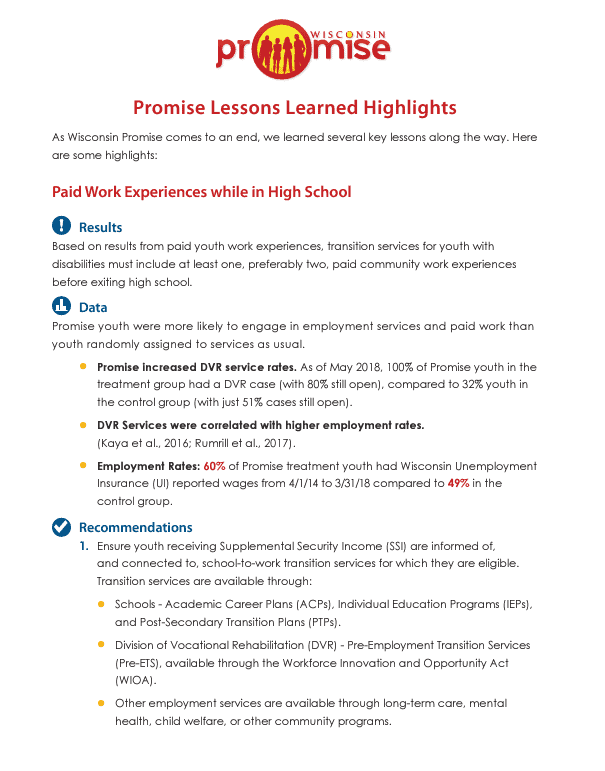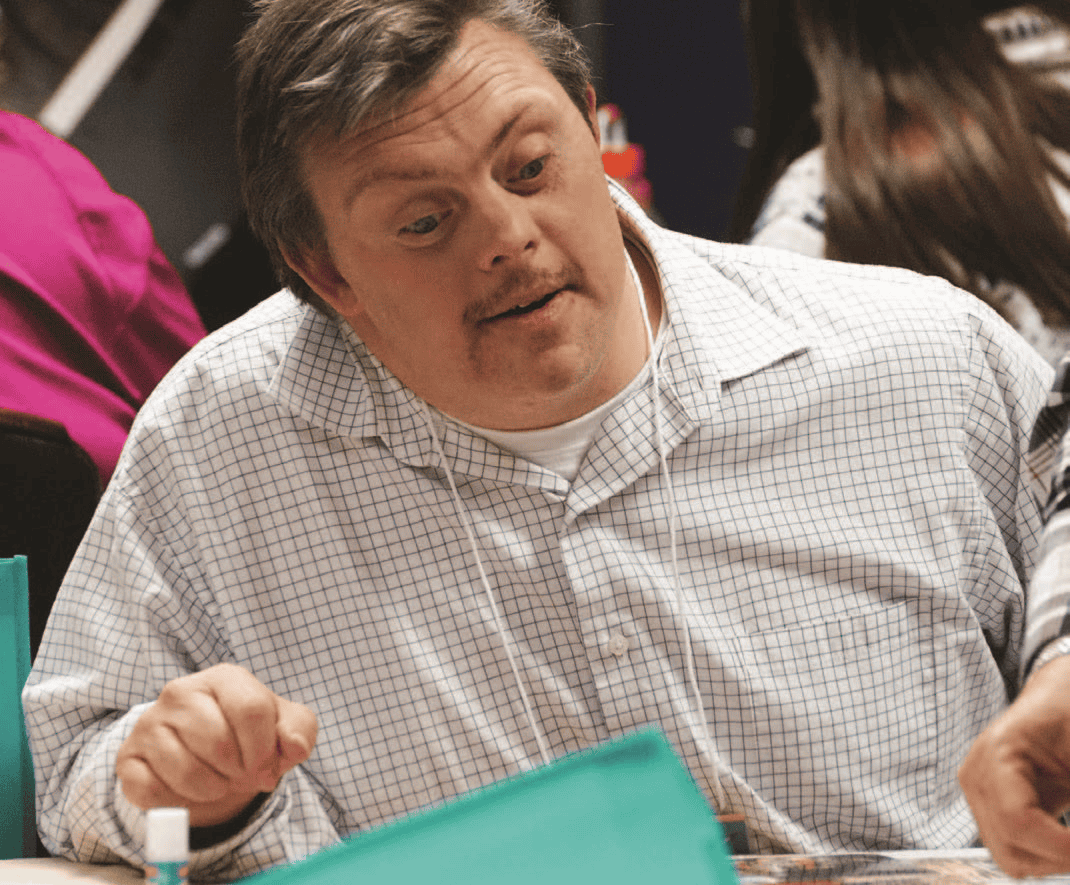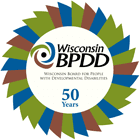Family Engagement:
States
Why Family Engagement Matters to States
To enhance family engagement and support for individuals with Intellectual and Developmental Disabilities (IDD), states must recognize the pivotal role that families play in the well-being of adults with IDD. The findings from The Arc’s
national Family & Individual Needs for Disability Services (FINDS) 2017 survey highlight the significant number of people with IDD living with their families. However, adult service systems often fall short in fully engaging, educating,
and supporting these families. The following blueprint outlines practical steps that states can take to create comprehensive statewide initiatives aimed at improving the lives of individuals with IDD by fostering greater family engagement.
In the Wisconsin Promise grant, a successful model of family engagement involved the implementation of a family navigator. This role proved essential in coordinating services and navigating complex systems, with a particular focus on increasing employment expectations and aiding in transition services and support. The family navigator, however, extended beyond employment-related goals, identifying and addressing various barriers that affected families and contributed to the success of youth in transition.
As families engage with adult service systems, they grapple with intricate eligibility requirements, funding sources, and the challenges of finding new providers, housing, employment, and transportation for their loved ones. The transition to adulthood is a critical period requiring specialized family navigation and services coordination to alleviate the potential overwhelm experienced by families facing new and complex considerations. However, the current lack of engagement and support from service systems can result in concerns such as overprotection, rights restrictions, segregation, limited community connections, and significant disruptions when primary caregivers pass away. It is imperative for families to proactively address these challenges.
The Living Well grant delves into best and promising practices that authentically engage families at the policy and legislative levels to enhance the lives of individuals utilizing home and community-based services. By implementing these
insights, states can establish a foundation for robust family engagement initiatives that empower families and contribute to the overall well-being and success of adults with IDD.
Findings from the Wisconsin Promise Project
62% of the 417 youth who have not met with a family advocate have worked
71% of the 594 youth who met with a family advocate have worked.
Youth that met with a family advocate had twice (2.4) the amount of jobs since enrollment as youth who haven’t met with a family advocate.
Youth that met with a family advocate at least once had twice (2.4) the weekly earning amount as youth who haven’t met with a family advocate.
77% of the 422 youth with families who completed the family advocacy training had a job while enrolled in Promise.
How States Can Engage Families
Invite Family Members to Participate on Advisory Groups: States should convey advisory groups that include family representation. This would include actively reaching out to families, inviting them to join these groups and providing any necessary orientation and support. Be sure to provide clear information on the purpose, goals, and expected time commitments of any advisory group.
Require Systems of Support to Engage Families: Integrate family engagement requirements into home and community based systems in the State. The requirements should include manage care organizations, self-directed agency and service provider contracts and agreements. States should develop
guidelines and benchmarks for family involvement in support including a
feedback opportunity for families to assess programs and supports.
Cultural Competency: Understanding and respecting the cultural, linguistic,
and social backgrounds of families and guardians is essential. Family
engagement needs to include gaining insight into the diverse needs and
perspectives of families and guardians that include cultural backgrounds, race,
and socio-economic status.
Use Community Conversations to Engage Families: The use of community
conversations is a successful approach to identify community assets and
opportunities and ways to jump start systemic change. These events help to raise expectations by the community about people with disabilities.
Create a Family Navigation/Family Mentoring Program: States should implement a program that pairs families with lived experience with those new to the system. The program should be included as a services in the Home and Community Based Waivers. The state would need to develop training and resources for family navigators/mentors.
Involve Families in the Person-Centered Planning Process: States should ensure that families are active participants in the development and review of care plans when the person receiving services wants them to be involved. Families may need training on the principles of person-centered planning.
Support the Inclusion of Future Planning in Home and Community Based Waivers: States should include future planning in HCBS waiver programs. Inclusion of future planning as a waiver services would assist families in helping
the person to make decisions and choices about their life before their family members pass away.
Encourage Supported Decision-Making: State’s should promote policies that recognize, and support supported decision-making agreements. States should actively work toward this alternative to guardianship as part of their
state statutes.
Advocate for New Policies and Funding that Protect Family Caregivers: With the current caregiver crisis, family caregivers are providing more support for their family members. States need to focus advocacy efforts on creating forward thinking policies that recognize and address the needs of family caregivers. States should collaborate with advocacy groups to influence legislation and secure funding.
Support Families to Attend Conferences and Training: States should provide financial assistance or scholarships for families to attend relevant conferences and training sessions. Collaborate with organizations to offer webinars and
virtual training opportunities. Create a centralized resource hub for families to access educational materials.
Tools for States
State HCBS Advisory Committees– States should, through legislation create HCBS Advisory councils. These councils should include specific representatives from a large partner group including family members and guardians of individuals
using HCBS services. Wisconsin’s council was first created in 1999.
The Promise Family Navigator Model– Family advocates were an integral part of the Wisconsin Promise Grant. The Family Advocates were individuals with lived experience similar to the families in the program. All family advocates were parents of youth with disabilities and lived in the same area as the family unit they were supported. In addition, they also shared the same race or ethnicity with the families they were serving. During the demonstration grant, the team found that participants were more likely to enroll and engaged when information about the project was shared by a peer with lived experience.
Guardianship Training Requirements– States should require guardians including family guardians to complete a training before the court assigns them as a guardian. Wisconsin changed the guardianship law to include this type of training.
Community Conversations: Community Conversations are a highly effective way to bring people together to raise awareness and identify partnerships and solutions to issues affecting the lives of people with disabilities. The State of Wisconsin has implemented this tool with their families of children accessing waiver services. States should consider this same format of engagement for family members.
The Arc Future Planning: A future plan is a guide for people with intellectual and developmental disabilities (IDD) to lead a good life as independently as possible. It can also help people with IDD reach their goals and dreams. The Arc has created the “Build Your Plan”® tool that enables families to create accounts and begin to build their plans. States could adopt and promote the use of the Arc Future Planning tools.
LOV, Inc’s Fearless Future: A Wisconsin Living Well provider offers future planning. The Fearless Future workshops include five educational sessions individuals with disabilities and their team create their own Fearless Future Plan. Teams can include the member, their primary caregiver, family members, friends, and paid. The workshops were designed by families to think critically about their loved one’s independence when their primary caregiver is no longer able to care for them.
Person-Centered Planning Tools: States should adopt of framework for educating people including families on person center planning. Tools to consider are Families Planning Together | The Learning Community for Person Centered Practices, UMN Its My Choice and LifeCourse Framework – LifeCourse Nexus
Supported Decision-Making: Supported decision-making empowers individuals with disabilities to make informed decisions about their life that protect their rights and ensure their safety and privacy. It involves family and friends
working together to help them make complex decisions. Service providers can share the information and tools from this website with families. Supported Decision-Making and Guardianship Alternatives | Wisconsin Board for People with Developmental Disabilities (wi-bpdd.org) and National Resource Center for Supported Decision Making: Supported Decision-Making | National Resource Center (supporteddecisionmaking.org)
Center for Medicaid Services Person and Family Engagement Strategy: CMS developed this strategy to share the Agency’s person and family engagement vision.
State Task Force on Caregiving: The Wisconsin Governor’s Task Force on Caregiving was created to support and strengthen the direct care workforce, increase access to care, and improve the quality of caregiving in Wisconsin. The Task Force provided input from family caregivers, professional caregivers, health care providers and other citizens interested in improving working conditions for individuals who care for people with disabilities and older adults, leading to a better quality of care for the people they serve.
Increasing Community Knowledge of HCBS Setting Rule: People with disabilities often face rights restrictions. Families and Guardians may sometimes be the people making those restrictions or as faced with a provider who may be imposing restrictions. It is important for families to understand the new HCBS setting rule. States should educate families on the implementation of the setting rule. The Council on Quality and Leadership assisted other states to educate on
Georgetown Center on Cultural Competence’s Cultural Competence Organizational Self-Assessment: The completion of a self-assessment on cultural competency will lead to a strategic organizational plan including how to engage family members and guardians more effectively.
Reflection Activity
Download the Reflection Activity to make your Family Engagement Action Plan!

Navigate the Blueprint
Tool Spotlight: Learn More about the Outcomes of the Wisconsin Promise Navigator Model

(click the picture to learn more)
Real Lives. Real Connections.
Wisconsin’s Survival Coalition Survey Results:
Families provide 80% of care for children and adults with disabilities and older adults
1 in 3 family caregivers expect to continue caregiving for the next 30 years
4 in 5 family caregivers have been caregiving at least 10 years
Link to Report

